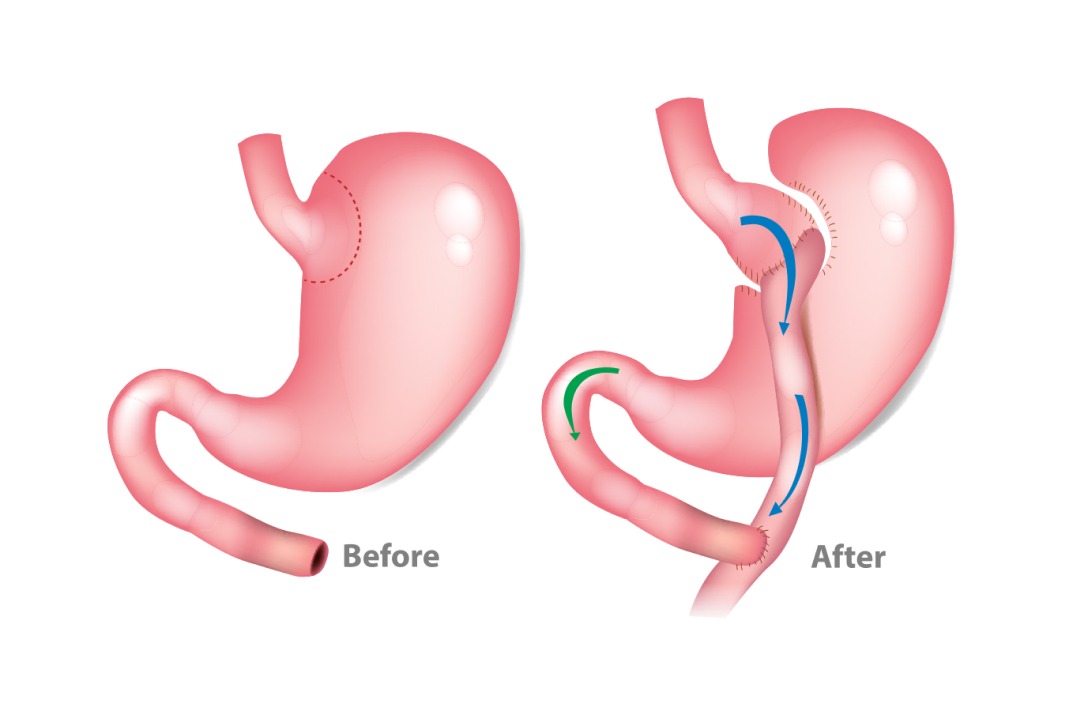CQC Registered Provider
Roux-en-Y Gastric Bypass
Private Gastric Bypass Surgery in the UK
Gastric Bypass Surgery with Allure
Sustainable Weight Loss
Within the first two years after your operation, the average weight loss is up to 70% of excess weight.
Improve Health Conditions
You can expect that obesity related health conditions will improve, including high blood pressure, type 2 diabetes, severe sleep apnoea, high cholesterol, and polycystic ovaries. Speak to our team to learn more.
Increased Mobility
After roux-en-y gastric bypass surgery, patients find they are able to do more physical activity, which can lead to an increase in energy, fitness, strength, and more.
Hours
Length of Surgery
The length of surgery for a gastric bypass takes between 1 to 4 hours to perform.
Night
Length of Stay
Typically, patients need one night in the hospital before continuing their recovery at home, but can sometimes require two or three.
Weeks
Time Off
2 weeks off work is typically required, depending on what you do for a living. Full recovery will take place between 6 and 8 weeks.
Gastric Bypass Surgery with Allure
Unlike a laparoscopic sleeve gastrectomy, a Roux-en-Y gastric bypass surgery works by creating a new structure out of the existing stomach, to create what’s commonly called a stomach pouch. Instead of removing a part of the stomach, it bypasses a portion of it, reducing the amount of food you can eat at any one time.
The gastric bypass is a permanent, major surgery that helps you lose weight when diet and exercise haven’t worked and your health is at risk of morbid obesity. As such, anyone interested should take their time to carefully consider all their options. Our team takes care to provide you with all the necessary information to make a measured and informed decision. If you need more help and guidance or would like to begin your weight loss journey with us, you should speak to one of our patient advisors today.
As a CQC registered provider, you can trust in our dedication to high quality patient care throughout. All Allure Weightloss Patients are privy to specialist aftercare, including dietitians and nurses to ensure that after your surgical procedure, you are cared for and able to maintain a healthy weight.
Gastric Bypass Surgery
You Can Expect
Up to 80%
Excess Weight Loss
Up to 4 hrs
Surgery Time
1-2 Nights
In Clinic
6-8 Weeks
Recovery Time
2-3 Weeks
Time off Work
Am I suitable?
Find out now
What Can Allure Patients Expect?
We offer a comprehensive weight loss surgery package that ensures you’re well taken care of from start to finish. We work with you before your laparoscopic gastric bypass surgery to make sure you’re able to have the operation and that you have all of the necessary information to make an educated decision. After your surgical treatment has been completed, we provide a tailored aftercare package that includes care from a dietetic and nursing team.
Pre-Op
You will be assessed to determine if you are eligible for the operation, which may include blood tests, x-rays, and scans, depending on your medical history. Our CQC Registered providers will give you an in-depth explanation of the surgery and the long-term outlook.
Before the gastric bypass surgery, you must avoid eating for several hours, but can continue to drink clear liquids until two hours before the surgery. You may need to stop medication in preparation for your weight loss surgery, but our consultant will advise you of this. You may also need to lose weight or follow the liver shrinkage diet in order to make room to access the stomach more easily during the surgery.
During Your Surgery
The gastric bypass is carried out under general anaesthetic. Typically, we will perform a laparoscopic gastric bypass surgery, but this isn’t suitable for everyone. Laparoscopic procedures happen through a small keyhole and are therefore not as invasive as typical open bariatric surgery.
During the operation, your consultant surgeon will make small incisions in your abdomen to pass through a tiny camera and instruments. They will then inflate your abdomen with carbon dioxide gas. Next, they will use surgical staples to make a stomach pouch, about the size of a walnut, and trim your small intestine, attaching the lower part of it directly to your new pouch.
The remainder of the stomach and upper small intestine are then joined to the lower part so that digestive enzymes from your stomach can drain out. Your surgeon will then close the incisions and suture to ensure that they heal well.

After Surgery Recovery
For the first two weeks after your bariatric surgery, you will need to wear compression stockings to prevent blood clots. In order to keep the dressings clean and dry, it’s necessary to not take a bath for one week, however showers are allowed.
After six weeks you should be back to normal activities. You will follow a controlled diet given by your nutritionist. The rapid weight loss will likely mean you experience several symptoms: aches, tiredness, dry skin, feeling cold, thinning hair, and fluctuations in mood. After three to six months, you should be experiencing less of these symptoms.
You should keep active after your operation to reduce the risk of blood clots forming, however, you should try to avoid any abdominal or heavy exercises for at least six weeks.
Aftercare/Ongoing Treatment
Your recovery care will include pain relief, a review of your medications, a carefully established diet, and an exercise plan. You will also be provided discharge medication that may include vitamin and mineral supplements like: Vitamin D, Calcium, multivitamin A-Z with iron, Vitamin B12, and Lansoprazole.
You’ll need to attend follow up appointments for the rest of your life and will require regular blood tests for the first two years after bariatric surgery. After time, these will become annual checks to ensure the gastric bypass is working properly.
Lifestyle Changes
In order to have sustained weight loss, you will need to make long term lifestyle changes. Bariatric surgery does not change cravings or prevent you from eating unhealthy foods. Immediately after your surgery, our aftercare team will work with you to build a new diet in order to prevent weight regain.
As you begin losing weight, your body will require additional protein to maintain muscle mass and have a healthy metabolism, which will require you to increase the protein in your diet.
Avoid drinking at the same time as eating to prevent vomiting and dumping syndrome. This is an uncomfortable set of symptoms caused by the food in your stomach being too sugary, or quickly washed into the small intestine through the join. Ensure that you’re drinking plenty of water throughout the day to prevent constipation.
If you’re planning to travel by plane within a few months of surgery, you should speak to your doctor first. Some complications may occur, including deep vein thrombosis (DVT).

Potential Side Effects
After such severe weight loss, you may begin to have thinning hair or you lose it. This is a temporary side effect that is likely to improve in the first few months. In order to avoid having dry skin after your gastric bypass surgery, drink plenty of fluids, take vitamin and mineral supplements, and apply a good moisturiser. You may also find that you experience body aches, tiredness, flu-like symptoms, feeling cold, and fluctuations in your mood as the body adjusts to the rapid weight loss.
Learn More About the Gastric Bypass Today
Private Gastric Bypass Clinics
Within our private bariatric surgery clinics, you will find only the highest standard of facilities that are poised to meet the standard of patient care we expect. Learn more about the size and quality of our clinics by clicking on the images below.
Gastric Bypass Eligibility Requirements:
- BMI of 35.
- Already attempted to lose weight via traditional methods, such as dieting and lifestyle changes.
- Willing to have long-term follow-up appointments.
- Willing to adopt a healthy diet and lifestyle.
- Medically fit for surgery and anaesthesia.
Your consultant may recommend gastric sleeve surgery first.
Gastric bypass surgery is not recommended for children and young people.
You may be required to pass a psychological assessment first.
Potential alternatives to gastric bypass surgery include:
Calculate Your BMI
Gastric bypass surgery requires you to have a BMI of at least 40. If you have a BMI of 35 you may be eligible, depending on whether you have any co-existing medical conditions. You can use our Calculator in order to determine your BMI, or use the NHS BMI Calculator.
How is body mass index (BMI) measured?
An individuals BMI is calculated by using the following formula:
BMI = Weight (kg) / Height (m)²
You must take your weight in kilograms, divide it by your height in meters, and then divide it a second time by your height in order to determine the correct body mass index.
Not sure you qualify?
If you still aren’t sure, a member of our team will be able to help. If you are certain you won’t qualify for gastric bypass surgery, you still may be eligible for other medical weight loss treatments.

Enquire Today
Start the process and book your private gastric bypass consultation today with Allure Weightloss. Simply speak to a member of our team to discuss the procedure and pathway in more depth. Allure Weightloss is a CQC registered provider of bariatric surgery in England and Wales.
Gastric Bypass FAQs
After surgery, you’ll not be able to eat until your X-ray and swallow test. At first, you’ll have to eat a soft diet and your dietitian will give you a diet plan for the weeks after surgery.
Surgery can be used to remove this excess skin, although under normal circumstances this is considered to be a cosmetic procedure.
Metabolic and bariatric surgery is common and most people have it without complications, but all surgery carries some risks. Your consultant will discuss potential risks and complications with you before the operation.
Yes, the surgery won’t stop you craving or eating unhealthy food. You must be willing to make long-term lifestyle changes in order to avoid any weight gain.
Gastric bypass surgery is generally non-reversible. There is a risk of you reversing your weight loss if you do not follow the advice provided.
It’s not recommended that you drink alcohol for the first six months. You will feel the effects of the alcohol faster than before because it absorbs differently. We do not advise drinking alcohol.
It’s okay to drink caffeine after your gastric bypass surgery, but you should avoid drinking too much as it acts as a diuretic and can cause dehydration.
You should avoid taking a class of medication known as non-steroidal anti-inflammatory drugs (NSAIDs) as these can irritate your stomach and cause stomach ulcers. Common drugs in this category include aspirin, ibuprofen, and naproxen.
Yes, your stomach may start to digest things differently, including iron. You may need to take iron supplements during your recovery to prevent any nutritional deficiencies, your doctor will advise you.
You must quit smoking at least 6 weeks before surgery. You must also not smoke at all after the surgery. Smoking can increase your chance of complications, such as stricture.
Case Studies
Take a look at some of our incredible weightloss success stories

Federica’s Gastric Balloon Journey
Federica lost a fantastic 9.4kg, a total of 12.8% of her starting body weight. Federica was able to use the gastric balloon tool as a way to kickstart a journey that she seeks to maintain with the knowledge she has gained from working with the Allure Dietitian.

Gillian Lost 20.31% of Her Weight with a Gastric Balloon
One of the first questions our team is asked is…

Costas Gastric Balloon Journey
Costas struggled to lose stubborn weight for the last few…

Jennifer Lost 18kg with a Gastric Balloon!
Jennifer, from Chelmsford, lost 18kg with a gastric balloon procedure…






